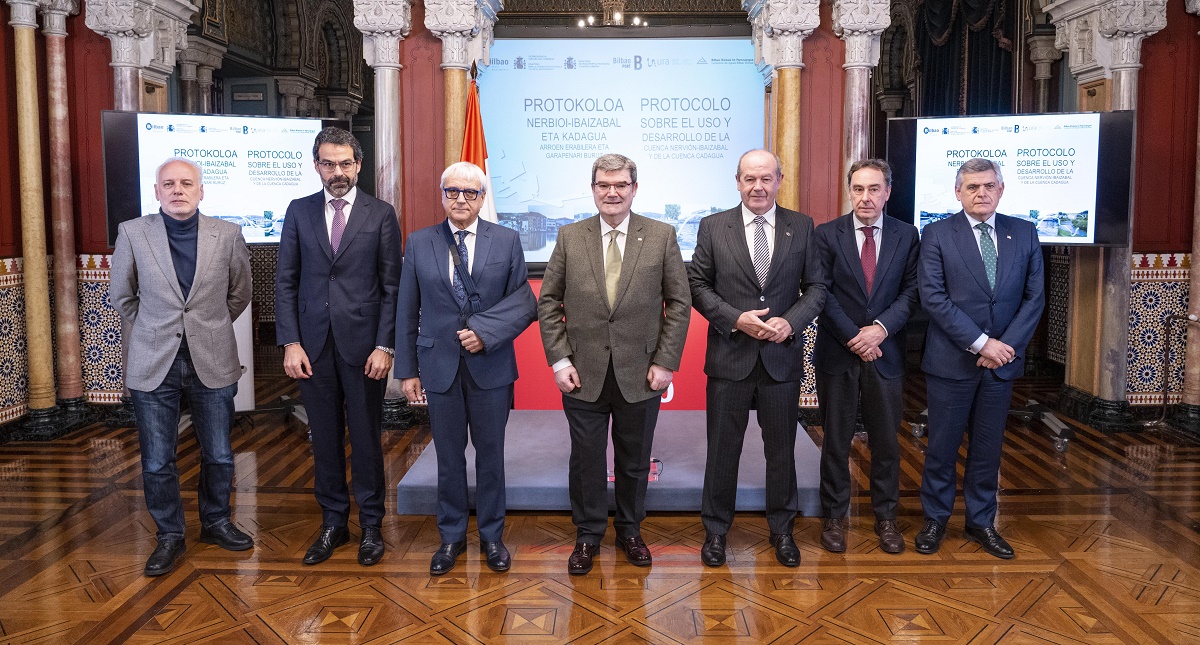This commitment, pioneer in Spain, has been undertaken by Bilbao City Council, the Ministry for Ecological Transition and Demographic Challenge (Directorate General for the Coast and the Sea), the Ministry of Transport, Mobility and the Urban Agenda (Directorate General of the Merchant Marine), the Port Authority of Bilbao, the Basque Water Agency URA and the Bilbao Bizkaia Water Consortium.
The agreement refers to both the Nervión-Ibaizabal basin and the Cadagua basin as it passes through the city of Bilbao. Through this agreement, the institutions involved consider it key to move forward in inter-institutional collaboration.
This is the first step towards reinforcing the joint definition of criteria, promoting coordination and speeding up the processing of administrative permits for uses, activities and projects related to the river.
This morning, the Arabian Room of the Bilbao City Hall has been the venue for the signing not only of a groundbreaking agreement in Spain but one of great significance for the future of Bilbao and its river. All the public authorities and entities with responsibilities in this environmental field have signed a Memorandum of Understanding in relation to the Use and Development of the Nervión-Ibaizabal and Cadagua river basins as they pass through the City of Bilbao.
The signatories to the agreement include Mr Juan Mari Aburto, Mayor of Bilbao, on behalf of the City Council: Mr Vicente Reyes, Head of the Central Government Sub-delegation in Bizkaia – accompanied by Mr Fernando Pérez Burgos, Head of the Coastal Demarcation in the Basque Country, and Mr Carlos García Buendía, sea captain, on behalf of the Directorate General of the Merchant Marine: Mr Ricardo Barkala, President of the Port Authority of Bilbao: Mr Toño Aiz, General Director of URA: and Mr. Kepa Odriozola, President of the Bilbao Bizkaia Water Consortium.
In signing this agreement, the public institutions and entities responsible for the river highlight that one of the main challenges facing Bilbao is to continue driving its transformation and sustainable development forward, a process in which “the Nervión-Ibaizabal and Cadagua basins play a strategic role”.
Furthermore, to achieve this goal, these same players believe “it is essential to tap further into potential inter-institutional collaboration, enabling a joint and coherent strategy to be defined for expansion, management and exploitation, and to reconnect and bring the people of the riverside environment closer to the city”, ensuring this is done in line with an inclusive and cross-cutting vision of the city which brings together “civic, cultural, educational, environmental and activation interests, prioritising resilience, safety and biodiversity in the urban environment”.
Through this agreement, which other public institutions could sign up to with an addendum, all the authorities and entities represented undertake to seek “formulas for collaboration” in their respective areas of competence, and to “strengthen the joint definition of criteria, share projects and speed up the processing of administrative permits” for projects and activities to be taken forward and developed in the maritime-terrestrial public domain and the public water domain.

Specifically, three strategic commitments are manifest in this document:
- to promote institutional collaboration to improve safety and resilience in the urban environment of the city of Bilbao;
- to promote the conservation, improvement and dissemination of its biodiversity; and
- to collaborate in the activation of the Nervión-Ibaizabal basin and the Cadagua basin as it passes through the city, seeking maximum effectiveness and efficiency.
Uses, activities and projects
The uses that the different administrations with powers in this field authorise are usually linked to the holding of sports, cultural, audiovisual, information and advertising events, activities to promote the basins, occasional and regular markets, seasonal sales stalls, festivals, fairs, etc.
In relation to these uses, the protocol signed today “will seek to speed up the processing of those activities that do not require significant coordination between the different parties for their authorisation”.
With regard to the study, assessment and, where appropriate, coordination of projects and events of importance in the area of the Nervión-Ibaizabal and Cadagua basins as they pass through the city (in other words, those that require “substantial coordination”), the parties involved undertake to seek “the best formula to enable the necessary coordination to, where appropriate, make it possible to hold or develop them”.
And all this with an eye to the future “taking into account the substantial increase in projects, uses and activities due to new urban development projects” in riverside areas such as Zorrotzaurre and Punta Zorrotza.

 Port access
Port access